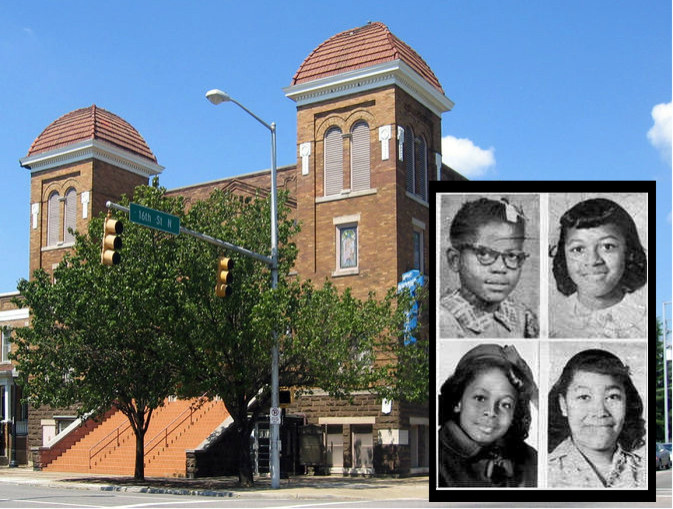50 Years After Birmingham Church Bombing, A Community (And Nation) Reflects

Addie Mae Collins, Cynthia Wesley, Carole Robertson and Denise McNair were murdered 50 years ago Sunday by a group of Ku Klux Klansmen who planted a box of dynamite on a timer under the steps of the 16th Street Baptist Church in Birmingham, Ala. The blast went off at 10:22 a.m. on Sept. 15, 1963, as a group of children had gathered in the basement to hear a sermon titled “The Love That Forgives.”
To commemorate this outrage that marked a bloody turning point in the civil rights movement, the Rev. Arthur Price delivered that same sermon on Sunday to hundreds of people gathered at the site of the terrorist attack that killed four girls, none older than 14, and wounded 22 others in a state that had seen dozens of bomb attacks by white Jim Crow racists against Alabama’s African-American minority.
Later on Sunday, U.S. Attorney General Eric Holder and other officials were scheduled to attend a more secular commemoration of the event at the site that has been a place of worship for the city’s black Baptists since at least 1884.
One of those worshipers, Carolyn McKinstry, who attended Sunday’s somber commemoration recalled the excitement the little girls had on that day.
"It was Youth Day . . . we were excited because that meant we got to do everything. We sang, we ushered, we did everything,” she told NPR. "They were combing hair. No doubt they were excited about the fact that it was Youth Sunday. And girls just like to talk and primp, you know."
The aftermath of the bombing underscored the deep and toxic race relations in Alabama. This was the home, after all, of the notorious Theophilus Eugene "Bull" Connor, Birmingham’s commissioner of public safety, a southern Democrat who led violent assaults against civil right activists.
The aftermath of the bombing is seared in the mind of former Secretary of State and college professor Condoleezza Rice, who on Sunday on NBC’s “Politics Nation” shared her experience growing up in Birmingham.
Rice was 8 years old at the time and says she was a childhood playmate of 11-year-old Denise McNair. Even before the bombing, Rice says the environment was dangerous for African-Americans of any age. They were expected to stay in their parts of town and not venture into commercial centers frequented by whites.
“There was no sanctuary. There was no place really safe,” she said on Sunday.
As with many other racist murders in the South in the Jim Crow era, nobody was charged with the bombing at the time. One witness came forward and fingered Robert Chambliss, a member of a KKK splinter group, as the main perpetrator who planted the bomb. Charges were reduced to possession of TNT without a permit. He was fined $100 and sentenced to six months in jail.
In the 1970s, state Attorney General Bill Baxley reopened the case after discovering new evidence held by federal investigators. Chambliss was sentenced in 1977. He was 73 years old and died a prisoner from natural causes in 1985. Herman Cash, Thomas Blanton and Bobby Cherry were also later identified as co-conspirators. Cash died before the arm of justice could get him, but Blanton and Cherry were indicted in 2001. Both men spent their remaining years behind bars.
© Copyright IBTimes 2024. All rights reserved.






















